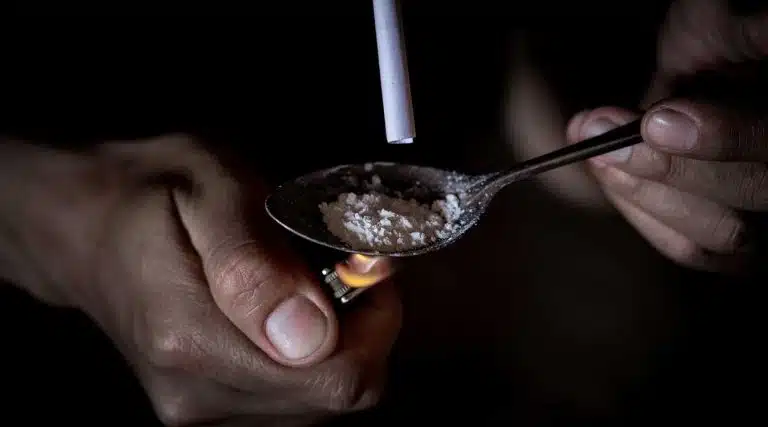Smoking Heroin | Can You Smoke Heroin?

Opiate drug heroin is primarily consumed in three different ways: injection, snorting and smoking.
Smoking heroin is dangerous and damaging, potentially leading to severe long-term health effects including dependence and addiction.
Why Heroin Is Smoked
Sometimes called chasing the dragon or freebasing, heroin has been smoked for decades, dating back to at least the 1920s in Shanghai.
By heating either powdered or black tar heroin (often on tinfoil over a flame, in a glass pipe, or mixed into cigarettes or joints), individuals are able to inhale heroin-laden vapors which then enter the bloodstream via the lungs.
Once heroin reaches the brain it triggers a rush of euphoria followed by a long period of mental cloudiness and warmth. It can take between 10 and 15 minutes for this high to kick in.
More Americans Are Smoking Heroin
Experts believe that, in the United States, more and more individuals are choosing to smoke heroin in order to avoid the stigma associated with injection drug use.
Others may smoke heroin as a harm reduction strategy, believing it to be safer or less addictive than snorting or injecting heroin.
Health Effects Of Smoking Heroin
Abusing heroin by smoking involves a number of different short and long-term health effects and dangers, including:
Lung Damage
Just as snorting drugs damages the nostrils and tissues in your sinuses, smoking heroin vapors damages your lungs and breathing. This damage is progressive, meaning that it gets worse the longer you continue to smoke.
Symptoms can include:
- chronic coughing
- decreased lung function
- early development of chronic obstructive pulmonary disease (COPD)
- early onset emphysema
- increased risk of heart disease and lung cancer
- lung irritation
- pneumonia and tuberculosis
- voice change and hoarseness
- worsening asthma symptoms and asthma development
- respiratory depression, slowed breathing, and worsened life-threatening breathing issues in the event of an overdose
Short-Term Side Effects Of Heroin Use
Whether heroin is smoked, injected, or snorted, it’s use comes with the same range of unwanted side effects, including:
- clouded or slow thinking
- dry mouth
- extreme itching
- heavy arms and legs
- nausea and vomiting
- nodding-off
- warm, flushed skin
Long-Term Health Effects
The longer you use heroin the harder it is to stop, and the more severe the health risks involved become. These may include:
- brain damage, specifically deterioration of the brain’s white matter
- chronic constipation
- cold Sweats
- increasingly risky behavior
- itching
- insomnia
- liver damage
- muscular weakness
- reduced memory and intellect
- sexual and reproductive dysfunction, including impotence
- tooth and gum damage
- unhealthy loss of appetite leading to weight loss and malnutrition
- weakened immune function
- worsening mental health including antisocial personality disorder and depression
Learn more about the Short-Term & Long-Term Effects Of Heroin Abuse
Can You Overdose From Smoking Heroin?
The risk of overdosing on heroin is greatest when the drug is injected rather than smoked. However, heroin overdoses can occur regardless of how the drug is consumed, especially if it is taken with other drugs like benzodiazepines, alcohol, or narcotics like fentanyl.
Heroin users may also choose to graduate from freebase heroin to injection as their addiction progresses, further increasing the risk of a dangerous or deadly situation.
Signs of a heroin overdose include:
- blue-tinted nails and lips
- drowsiness
- low blood pressure
- pinpoint pupils
- weak or fluttering pulse
- weak, slow, or interrupted breathing
If an overdose occurs, summon medical assistance as quickly as possible and administer naloxone (Narcan) if possible. Overdoses can be fatal or result in permanent physical harm, and responding quickly can make a life-saving difference.
Learn more about Heroin Overdose
Heroin Addiction Treatment
Smoking heroin can lead to severe physical dependence as your body becomes tolerant to the drug. Once you reach this point your highs are going to get lower and lower, and as the drug leaves your system you may begin to experience worse and worse withdrawal symptoms.
Medical Detox
Medical detox programs are strongly recommended as the first step in the rehab process to help you get through withdrawal safely. These programs supervise and oversee your withdrawal symptoms to ensure you’re safe and comfortable while you prepare for treatment.
Medication-Assisted Treatment
Medication-assisted treatment (MAT) using FDA-approved medications like buprenorphine, methadone, or naltrexone to reduce cravings and dependence, as well as change how opioids affect your brain. MAT combines medication with behavioral therapy and peer support.
Inpatient Or Outpatient Treatment
Depending on the severity of your addiction, your treatment plan may involve full-time treatment inside a rehab facility or regular visits as you commute from your home.
The process will likely involve group therapy, behavioral therapy, and supportive programs like yoga, art therapy, counseling, education, and support groups.
To learn more about personalized treatment programs for substance use and drug addiction, contact an Ark Behavioral Health specialist today.
Written by Ark Behavioral Health Editorial Team
©2024 Ark National Holdings, LLC. | All Rights Reserved.
This page does not provide medical advice.
National Center for Biotechnology Information - Heroin smoking by 'chasing the dragon': origins and history
National Drug Intelligence Center - Heroin Fast Facts
National Institute on Drug Abuse - Heroin Research Report Overview

Questions About Treatment?
Ark Behavioral Health offers 100% confidential substance abuse assessment and treatment placement tailored to your individual needs. Achieve long-term recovery.
100% confidential. We respect your privacy.
Prefer Texting?
Our friendly support team is here to chat 24/7. Opt out any time.







 Learn More
Learn More








